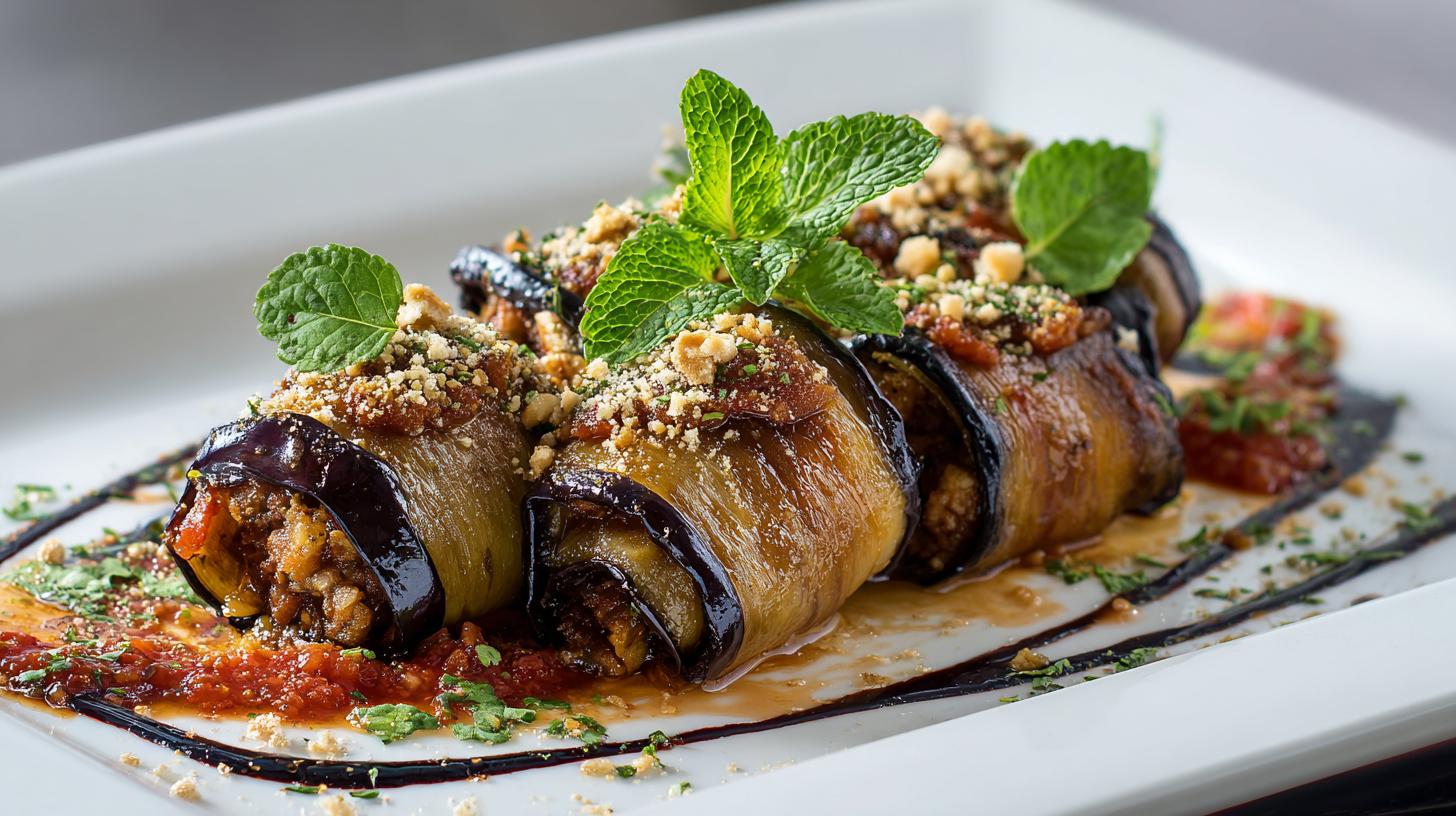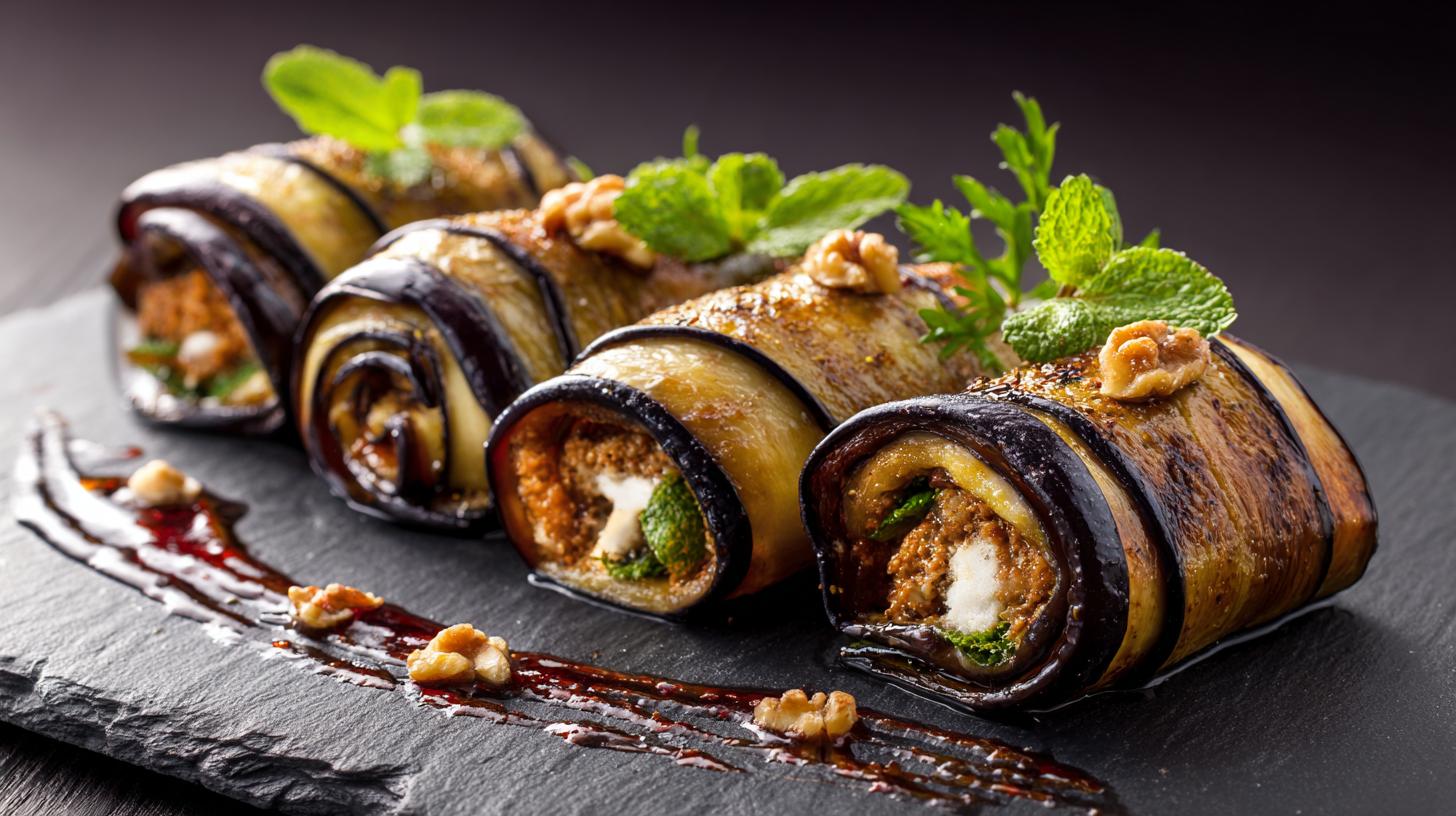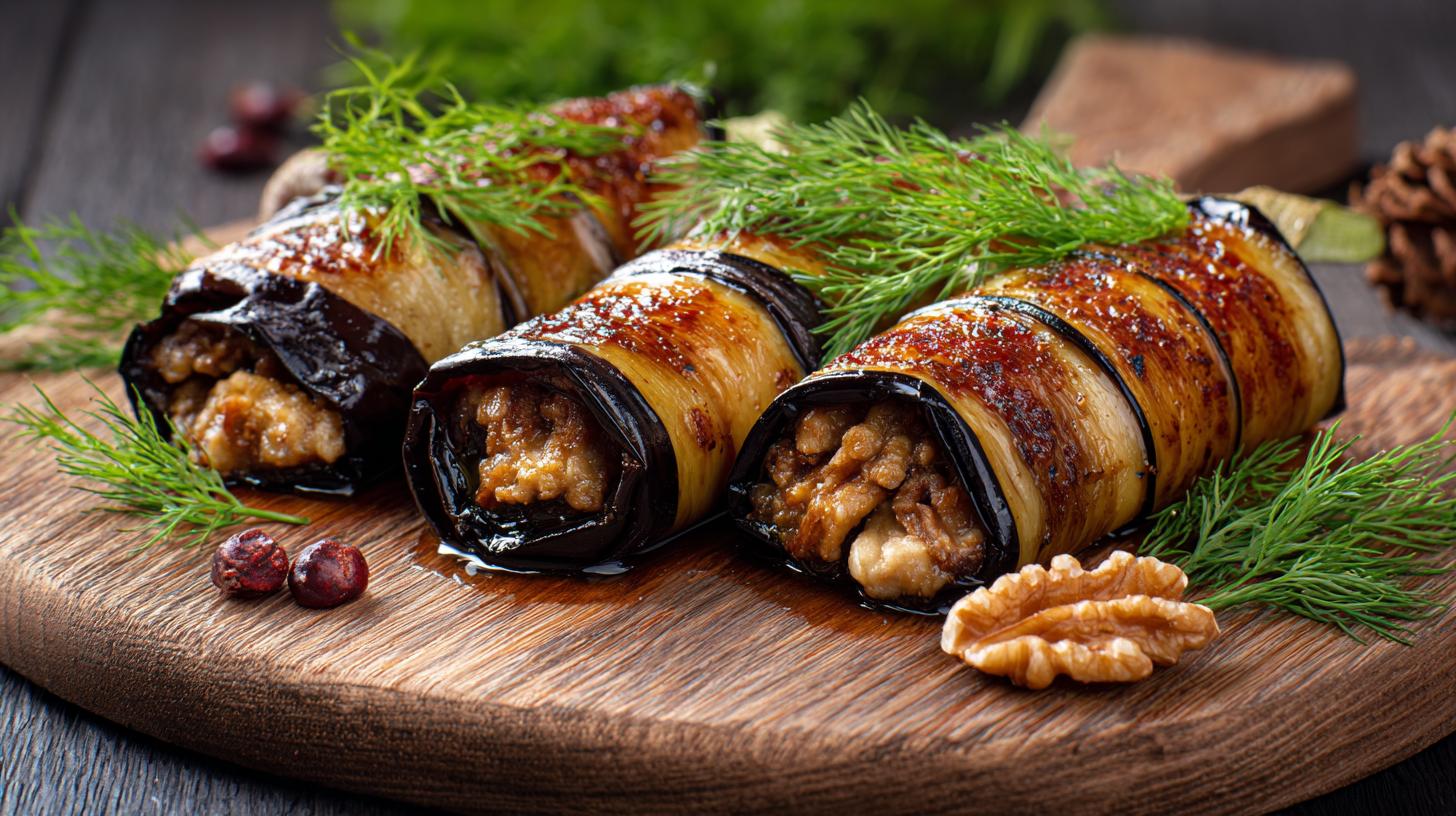Nigvziani Badrijani is a traditional Georgian dish that beautifully combines the earthy flavors of eggplant with a rich, aromatic walnut paste. This popular appetizer, often referred to as eggplant rolls with walnut paste, showcases the unique culinary heritage of Georgia—a country where walnuts are a staple ingredient, and eggplants are celebrated for their versatility. The delicate balance of textures and the blend of spices create a dish that is both refreshing and hearty, perfect for gatherings or as a part of a festive spread.
Eggplant, with its tender flesh and slightly smoky undertones when cooked, forms the perfect vessel for the luscious walnut filling. The walnut paste used in Nigvziani Badrijani is not just a simple spread but a complex mixture infused with garlic, herbs, and aromatic spices that amplify the dish’s flavor profile. Together, the thin eggplant slices and the creamy walnut paste create a harmonious dish that has been enjoyed across generations in Georgian cuisine.
The Origins and Cultural Significance of Nigvziani Badrijani
Nigvziani Badrijani has deep roots in Georgian culinary culture. The name itself literally translates to “Walnut Eggplants,” reflecting the two primary ingredients. Georgia, located at the crossroads of Europe and Asia, boasts a rich history of combining local produce with distinctive flavors. Walnuts have been cultivated in the region for centuries and are a beloved ingredient used in many traditional Georgian dishes. Eggplants, introduced to the area long ago, became another key vegetable in the Georgian diet.
In Georgia, Nigvziani Badrijani is more than just food; it represents hospitality, celebration, and regional pride. It is often served during supra, the traditional Georgian feast, where an emphasis is put on sharing dishes that bring people together. The dish’s preparation and presentation also signify respect and care, with the rolls often garnished intricately before being served.
The Key Ingredients of Nigvziani Badrijani
To understand the uniqueness of Nigvziani Badrijani, it’s essential to look at its fundamental ingredients and their roles in the dish:
- Eggplants: Use medium-sized eggplants with tender flesh and minimal seeds for the rolls. They must be sliced thinly lengthwise to form perfect wrapping strips.
- Walnuts: The core of the walnut paste, walnuts provide a rich texture and flavor. Fresh, shelled walnuts are preferable for the best aroma and taste.
- Garlic: Adds pungency and depth to the walnut paste.
- Fresh herbs: Typically cilantro and dill are used, bringing freshness and vibrant aroma.
- Spices: Ground coriander and blue fenugreek (utskho suneli) are key Georgian spices that enhance the paste’s complexity.
- Vinegar or lemon juice: Introduces acidity to balance the richness of the walnut paste.
- Salt and pepper: For basic seasoning.
- Vegetable oil: For frying the eggplant slices until golden and soft.
Each of these ingredients plays a distinct role, harmonizing to create the beloved flavor and texture of nigvziani badrijani eggplant rolls with walnut paste.
Preparing the Eggplants: The Foundation of Nigvziani Badrijani
The first step in making eggplant rolls with walnut paste is preparing the eggplants properly. The process begins by selecting fresh, firm eggplants free of blemishes. After washing, they are sliced lengthwise into thin strips—about 4 to 5 millimeters thick. Thinner slices allow the rolls to be delicate yet sturdy enough to hold the filling.
Since eggplants can be bitter and prone to absorbing oil during frying, a common practice is to sprinkle the slices with salt and let them sit for about 20-30 minutes. This step draws out excess moisture and bitterness. Afterward, the slices are patted dry with a kitchen towel.
Next comes frying. Traditional preparation uses vegetable oil heated in a pan, where the eggplant slices are fried until golden brown on both sides. This results in a slightly crispy exterior and soft interior—ideal for rolling. After frying, the eggplants are placed on paper towels to drain excess oil.
Crafting the Walnut Paste Filling
While the eggplants are resting, the walnut paste is prepared. This filling is the heart of the dish, a complex blend of flavors and textures.
To make the walnut paste, shelled walnuts are finely ground, either using a food processor or the traditional method of pounding in a mortar and pestle. This helps achieve a slightly coarse texture that contributes to the paste’s character. A perfectly smooth paste can also be used based on preference.
The ground walnuts are then mixed with minced garlic, fresh herbs such as chopped cilantro and dill, ground coriander, blue fenugreek if available, and a splash of vinegar or lemon juice for acidity. Salt and black pepper are added to taste. Some recipes might incorporate a small amount of water or oil to adjust the consistency, making the paste creamy and spreadable but not too loose.
Assembling the Nigvziani Badrijani Eggplant Rolls with Walnut Paste
With all components prepared, assembly begins. Each eggplant slice is spread evenly with a generous layer of walnut paste. The spread should cover the slice lengthwise but not be so thick that it overwhelms the delicate eggplant. After spreading, the slices are carefully rolled from one end to form compact rolls.
These rolls are typically arranged on a large serving plate. Some cooks garnish them with pomegranate seeds, chopped fresh cilantro, or a drizzle of pomegranate molasses to add color and a touch of sweetness that complements the savory flavors.
Variation and Serving Suggestions
There are several variations of nigvziani badrijani across Georgia and neighboring regions. Some include a bit of mild chili pepper or add crushed walnuts for extra texture. Others incorporate a sprinkle of dried mint or use different herbs based on availability.
This dish can be served as part of an appetizer spread or with main courses such as grilled meats, soups, or hearty stews. Its refreshing yet rich taste makes eggplant rolls with walnut paste a versatile choice for any meal.
Health Aspects of Nigvziani Badrijani
Eggplants and walnuts both offer distinct health benefits, making nigvziani badrijani not just flavorful but also nutritious. Eggplants contain antioxidants like nasunin and are a good source of dietary fiber, which supports digestive health. Walnuts are rich in omega-3 fatty acids, protein, and essential minerals.
While the frying step adds oil and calories, the overall dish can be balanced within a varied diet. Some modern adaptations bake the eggplant slices or grill them to reduce oil content while retaining flavor.
Step-by-Step Recipe for Nigvziani Badrijani: Eggplant Rolls with Walnut Paste
Below is a detailed recipe to help you prepare this Georgian classic at home.
| Ingredient | Quantity | Notes |
|---|---|---|
| Eggplants | 2 medium | Firm, medium-sized |
| Walnuts (shelled) | 1 cup (about 120g) | Fresh |
| Garlic cloves | 2-3 | Minced |
| Fresh cilantro | 1/4 cup | Chopped |
| Fresh dill | 1/4 cup | Chopped |
| Ground coriander | 1 tsp | – |
| Blue fenugreek (utskho suneli) | 1/2 tsp (optional) | Available in Georgian spice shops |
| Red wine vinegar or lemon juice | 1-2 tbsp | Acidity for balance |
| Vegetable oil | For frying | Sunflower or any neutral oil |
| Salt and pepper | To taste | – |
| Pomegranate seeds (optional) | For garnish | Adds sweetness and crunch |
Instructions:
- Wash and slice the eggplants lengthwise into slices about 4-5 mm thick.
- Sprinkle the eggplant slices with salt and let them rest for 20-30 minutes to remove bitterness. Then pat dry with paper towels.
- Heat vegetable oil in a frying pan over medium heat. Fry the eggplant slices until golden on both sides, about 2-3 minutes per side. Drain on paper towels.
- Grind walnuts finely using a food processor or mortar and pestle.
- In a bowl, combine ground walnuts with minced garlic, chopped cilantro, dill, ground coriander, blue fenugreek (if using), vinegar or lemon juice, salt, and pepper. Mix until well blended. Add a little water or oil if the paste is too thick.
- Spread each fried eggplant slice evenly with walnut paste.
- Roll up each slice tightly, starting from one end.
- Arrange the rolls on a serving dish. Garnish with pomegranate seeds and additional herbs if desired.
- Serve at room temperature as an appetizer or side dish.
Tips for Perfect Nigvziani Badrijani Eggplant Rolls with Walnut Paste

Preparing this dish involves some careful steps, but with these tips, you can ensure great results:
- Slice eggplants evenly: Using a mandoline slicer helps achieve consistent thickness that cooks evenly.
- Drain eggplants well: Salting and drying the slices reduces oil absorption during frying.
- Use fresh walnuts: Old or rancid walnuts can impart bitterness, so always aim for fresh nuts.
- Adjust the walnut paste consistency: The paste should be spreadable but firm enough to hold shape inside the rolls.
- Experiment with herbs and spices: Feel free to adjust quantities of garlic, coriander, and fenugreek according to your taste.
- Control oil amount: For a lighter dish, consider baking or grilling eggplant slices instead of frying.
Accompanying Dishes and Pairings
Nigvziani badrijani eggplant rolls with walnut paste fit well into diverse meal settings. Because of their savory and slightly tangy flavor, they balance well with grilled meats such as lamb or chicken kebabs typical in Georgian cuisine. They also pair nicely with fresh salads, crusty bread, and dips like tzatziki or ajika, a spicy Georgian pepper sauce.
A glass of dry white wine or a light red complements the walnut-rich flavors, enhancing your dining experience.
The Role of Nigvziani Badrijani in Modern Cuisine

While Nigvziani Badrijani remains a staple in traditional Georgian feasts, it is increasingly appreciated by global food enthusiasts interested in diverse flavors and plant-based dishes. The eggplant rolls with walnut paste are naturally vegetarian and can be adapted to vegan diets. Their use of nuts and fresh herbs aligns with contemporary trends favoring whole foods and bold tastes without relying heavily on meat or processed ingredients.
In modern cookbooks and restaurants, nigvziani badrijani has been reinterpreted with creative twists—such as adding pomegranate molasses glaze, incorporating spices from other regions, or serving as an elegant canapé at events. Yet the heart of the dish remains in the careful balance of eggplant and the signature walnut paste.
Exploring Variations Across Regions
Although primarily Georgian, similar recipes and versions of eggplant rolls with walnut paste can be found elsewhere in the Caucasus and Middle East. Differences may include variations in spices, the addition of yogurt or cheese, or serving the dish warm instead of room temperature.
A notable variation includes adding fresh or dried mint to the walnut paste, which introduces an additional refreshing note. Some cooks substitute coriander for cumin or add a hint of chili for subtle heat. Understanding these variants broadens appreciation of nigvziani badrijani and its importance within a larger culinary tapestry.
Storage and Leftover Ideas
Nigvziani badrijani eggplant rolls with walnut paste can be refrigerated for up to two days, making them convenient for meal prep or parties. The flavors often deepen after resting as the walnut paste melds with the eggplant.
If you have leftovers, consider these ideas:
- Serve chilled as a ready-to-eat snack or appetizer.
- Use chopped rolls as an ingredient in salads or grain bowls.
- Spread leftover walnut paste on crackers or bread for a quick snack.
- Add the rolls to wraps or sandwiches for added flavor and texture.
Summary of Key Points

Nigvziani badrijani eggplant rolls with walnut paste encapsulate centuries of Georgian culinary tradition. This dish combines tender fried eggplant slices with a vibrant walnut paste made from ground nuts, herbs, spices, garlic, and vinegar. The resulting rolls are a balanced fusion of flavors—earthy, savory, tangy, and nutty.
Preparing nigvziani badrijani involves attention to ingredient quality, proper eggplant handling to remove bitterness, and crafting a flavorful, well-seasoned walnut paste. The dish serves a variety of purposes, from festive appetizers to everyday side dishes, and can be adapted to address modern dietary preferences.
Whether enjoyed in a family setting, at a festive supra, or recreated in kitchens worldwide, nigvziani badrijani eggplant rolls with walnut paste remain a beautiful example of cultural heritage expressed through food, a simple yet elegant vehicle to explore new tastes and textures.